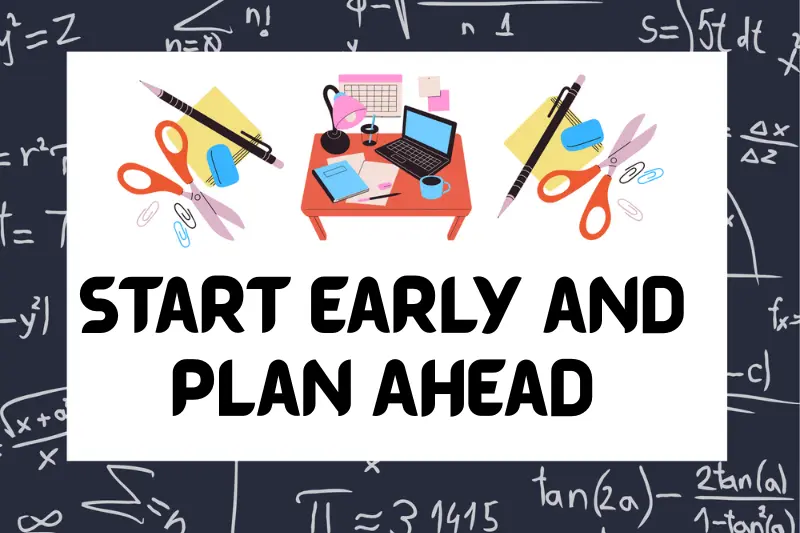For many students, exam season feels like a rollercoaster—late nights, endless notes, and a lot of pressure to do well. Whether it’s a high school final, a college test, or a competitive exam, the stress can really pile up. Imagine this: you’ve got three subjects to revise, your notes are scattered, and the clock is ticking. It’s overwhelming, right?
But don’t worry—with the right exam preparation tips, you can stay calm, focused, and in control. A smart and steady study plan can help you cut through the chaos and give you the confidence to walk into your exam ready to succeed.
1. Start Early and Plan Ahead

One of the most important exam preparation tips is to begin your studies well in advance. Waiting until the last minute often leads to panic and shallow learning. Instead, start preparing as soon as your exam dates are announced.
Create a personalized study plan that fits your daily routine. Divide your subjects into small, manageable topics and assign each topic to a specific date. Give more time to difficult subjects and less time to ones you’re confident in. Don’t forget to include breaks, buffer days for revision, and some time for relaxation.
Use tools like digital calendars, planner apps (like Notion, Todoist, or Google Calendar), or traditional paper planners to map out your schedule. A clear plan helps you track your progress and reduces the stress of wondering what to study next.
You may also like to read this:
How To Focus While Studying: Easy Tips For Staying On Track
Top 10 Time Management For Students: Balance School And Life
Top 10 Effective Study Techniques To Boost Retention
Top 15+ Study Hacks For Better Grades: Improve Your Focus
Best eBooks For Students | Smart Learning Guide 2025
Best Reading Lists For Beginners | Start Reading Today
2. Understand the Exam Format and Syllabus
Before you start studying, it’s crucial to know what exactly you’re preparing for. Review the syllabus thoroughly to understand what topics will be covered and how much weight each topic carries.
Next, learn about the exam format:
- Will it be multiple-choice, descriptive, or a combination?
- How many sections are there?
- Are there any negative markings?
Gather past year question papers, mock tests, and model papers. These will give you insight into frequently asked questions, question patterns, and time allocation. The more familiar you are with the format, the more confident you’ll feel on exam day.
3. Choose the Right Study Environment
Your environment can make or break your focus. Find a quiet place with minimal distractions—this could be your room, a library, or even a coffee shop with calm vibes.
Make sure your study space is clean and organized. Keep all your materials—books, notes, stationery, and water—within easy reach. Use comfortable seating and good lighting to reduce fatigue.
Also, try to eliminate distractions. Turn off notifications on your phone or use apps like Forest or Focus@Will that help you concentrate. Everyone has different preferences—some like silence, while others focus better with soft music. Experiment and find what suits you best.
4. Use Effective Study Techniques
Reading your notes over and over isn’t always the best way to learn. Here are some powerful techniques to study smarter:
- Active Recall: Instead of re-reading, try to recall information from memory. For example, cover your notes and ask yourself questions about the topic.
- Spaced Repetition: Revise material at increasing intervals over time (1 day, 3 days, 7 days, etc.). Apps like Anki or Quizlet can help with this method.
- Mind Mapping: Draw visual diagrams that connect key ideas. This is great for subjects that require understanding over memorization.
- Flashcards: Great for quick reviews, especially for subjects like biology, math formulas, or vocabulary.
These methods help your brain engage with the content, making it easier to remember later.
5. Break Study Sessions into Chunks

Don’t try to study for hours on end. It leads to burnout and reduced concentration. Instead, use the Pomodoro Technique:
- Study for 25 minutes
- Take a 5-minute break
- After four cycles, take a 15–30 minute longer break
This keeps your brain fresh and helps retain information better. During breaks, avoid screens—stretch, walk, meditate, or just rest your eyes. Your mind needs downtime to recharge.
6. Stay Physically and Mentally Healthy
You can’t perform well in exams if your body and mind are worn out. Prioritize:
- Nutrition: Eat brain-boosting foods like leafy greens, nuts, eggs, fruits, and whole grains. Avoid junk food and sugary snacks.
- Hydration: Drink plenty of water throughout the day.
- Exercise: A short daily workout, yoga session, or walk can improve blood flow and reduce anxiety.
- Sleep: Don’t cut down on sleep to study more. Aim for 7–8 hours every night. Sleep is crucial for memory retention and overall brain function.
7. Practice With Past Papers
Practicing past exam papers is a game-changer. It helps you:
- Understand the types of questions asked
- Learn how to structure your answers
- Improve time management
- Reduce exam-day surprises
Time yourself when solving these papers. Simulate the real exam environment—no breaks, no help. Analyze your mistakes afterward and revise those areas.
8. Seek Help When Needed
If you’re stuck on a difficult topic, don’t stay stuck. Ask your teachers, tutors, or friends for help. Sometimes, just hearing an explanation from someone else can make things click.
You can also join a study group. Discussing topics with others helps reinforce your knowledge and gives you different perspectives.
Don’t forget to explore online learning platforms like Khan Academy, YouTube, or Coursera, where experts break down complex topics into easy-to-understand lessons.
9. Stay Motivated and Positive
It’s easy to lose motivation, especially if the syllabus is long or if you’re feeling overwhelmed. Keep your spirits high by:
- Setting small, daily goals
- Rewarding yourself after completing tasks (a snack, a short movie, or a walk)
- Using motivational quotes or affirmations
- Visualizing your success
Avoid comparing yourself with others. Everyone learns differently. Focus on your growth and progress.
10. Revise and Review Regularly
Don’t wait until the last moment to revise. Make revision a regular part of your routine:
- Create summary notes or cheat sheets for quick review
- Use color-coded highlights to spot important points easily
- Focus on understanding, not just memorization
During the final week before the exam, do a full review. Go over your notes, formulas, and tricky topics. Practice a few mock tests. Don’t try to learn new material—just polish what you already know.
Conclusion
Success in exams isn’t just about how many hours you study, but how you study. By following the right exam preparation tips, you can manage your time better, reduce stress, and improve your performance. From planning ahead and using active study methods to staying healthy and practicing past papers, every step plays a key role in your success.
Stay consistent, stay positive, and don’t be afraid to ask for help when you need it. With a focused mindset and smart strategies, you’ll be well-prepared to tackle any exam with confidence. Remember, these exam preparation tips aren’t just for scoring marks—they help build habits that last a lifetime.
You’ve got everything it takes to succeed—now go out there and ace those exams!








